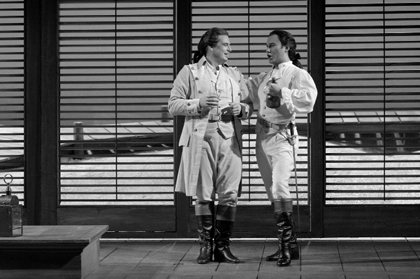Strauss and Mozart operas put young love to the test
The October 15 Carnegie concert performance of “Daphne” showed an international artist in top form giving sharp stylistic point, linguistic clarity, and rich, apt tone to Richard Strauss’ difficult vocal writing. The problem was the artist was the always-excellent bass-baritone Eike Wilm Schulte, in the role of the First Shepherd, who sings for about four minutes. The other three Shepherds (Joerg Schneider, Gregory Reinhart, and Charles Temke) were also cast from strength, as were the two ditzy maid-attendants, Susanne Bernhard and the highly promising young soprano Julia Kleiter.
Renée Fleming’s incarnation of what would seem a logical Strauss heroine for her to take on was received as a triumph by the audience and the city’s leading newspaper.
It was not.
Well, perhaps a marketing triumph could be granted, since this evening formed part of a tour “behind” her current CD release, and Fleming was dressed and coiffed as on one of her glossy album covers, and wore, practically throughout the concert, a little smile which seemed utterly at odds with the character she was portraying—a young woman desperate not to be thrust into a barbaric ritual of sexual initiation that her parents and social peers expect her to embrace. Daphne, recognized by the jealous and desiring god Apollo as a being marked by apartness, finally gets transformed into a tree, in some of Strauss’ most inspired orchestration—and a wordless vocal line that Fleming sang very well indeed.
Shaw wrote that Verdi’s Count di Luna should never sit down; surely Strauss’s Daphne should never smile. But Fleming’s problem was not visual; the voice was only rarely at its focused best, and she skated and slid around both accuracy of pitch and comprehensibility of words virtually all night. In recordings of the first Daphne, Margarete Teschemacher, and of her contemporary Maria Reining—a great favorite of the composer’s—both show big, shining instruments with considerable oomph. Fleming managed this only in a few exciting isolated high notes, settling too often for a gooey, whipped cream tone. For an admirer of the score—as distinct from Josef Gregor’s rather awful libretto—and one who remembers Fleming’s substantive achievements in “Rusalka,” “Otello,” and “Arabella,” this proved a dispiriting evening.
Karl Böhm’s 1964 recording with James King and Fritz Wunderlich both in phenomenal form as Daphne’s divine and mortal suitors pretty much spoils one for any other tenors negotiating these cruelly written parts. Johan Botha deserves kudos for soldiering through Apollo’s hurdles with impressive power and stamina. Roberto Saccà hit Leukippos’ notes and made virtually no impression. Semyon Bychkov seemed more at home than in his Met “Boris Godunov” in juggling orchestral detail; the WDR Symphony Orchestra Cologne played with admirable responsiveness, if not quite a first-rate sound.
The season premiere of the Met’s “Così fan tutte” on October 21 proved a very happy night in the theater. When “big house Mozart” goes as well musically as did this performance under James Levine, one can set aside a preference to hear works like this in small theaters with a chamber orchestra. Michael Yeargen’s lovely sets and costumes and Duane Schuler’s luminous lighting make this by far the most beautiful of the company’s current Mozart stagings—not that the Jonathan Miller “Figaro” or the Marthe Keller “Don Giovanni” raises that particular bar too high. The current stage director, Robin Guarino, got the big outlines and flow right, but didn’t present a cogent resolution to the lovers’ quandary. She fostered, or permitted, too much “acting funny;” it seems clear enough from Mozart’s music that Fiordiligi and Ferrando, at least, should be in deadly earnest at all times. Were miraculous circumstances to place me in charge of the Metropolitan Opera, my first rulings would pertain to the admittedly tricky business of staging comedies in such a huge house—no artist shall place props or bodily parts on the prompter’s box in a cheap attempt to foster intimacy, and no singer shall end an aria with a phony burst of laughter.
With a few signal exceptions, mainly among lower voices, actual Italians singing Mozart’s Italian operas were not that common a phenomenon until quite recently. Neither of the two Italian sopranos—Barbara Frittoli as Fiordiligi and Nuccia Focile as Despina—was perfect vocally. Frittoli took time to warm up, tended towards a kind of tonal whiteness, and, like many Fiordiligis, could only sketch in the tough low notes; Focile sounded distinctly pinched on top in a very low-lying part. But hearing authentic speech patterns and coloration is always salutary, especially in da Ponte’s recitatives; plus, Frittoli decorated her music with dash, and got stronger as she progressed. Focile has the personality for the wise maid’s part and might have given us half the “comic” touches assigned her and made twice the effect.
Magdalena Kozena wrapped her gorgeous high, light mezzo around Dorabella’s music with vivid creativity—a superb performance. Her equal in vocal quality was Mariusz Kwiecien’ dapper Guglielmo. Matthew Polenzani got to sing all three of Ferrando’s difficult arias and did so with increasing confidence, contributing much of beauty to the ensembles. Thomas Allen, even with an evident cold absolutely traced a class act as Alfonso. A memorable Met evening.
David Shengold (shengold@yahoo.com) writes about opera for many venues.
gaycitynews.com


































